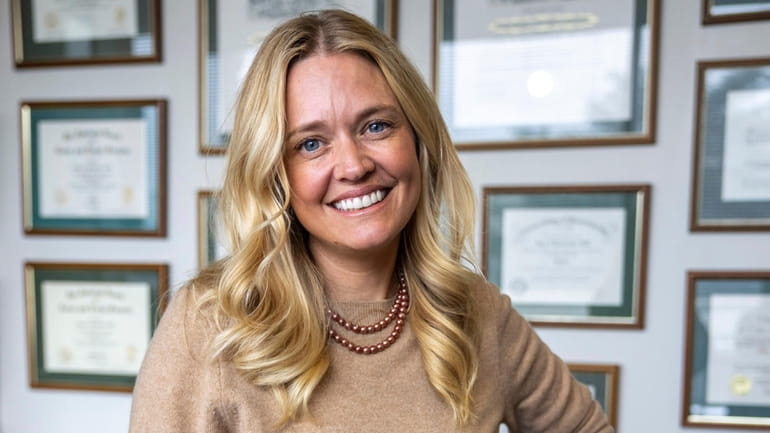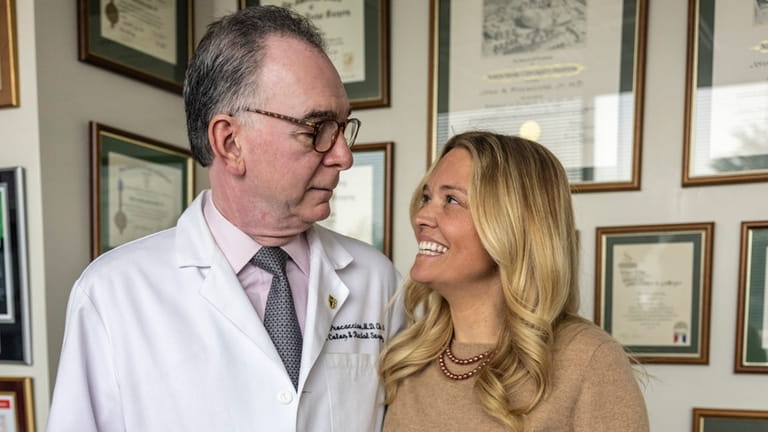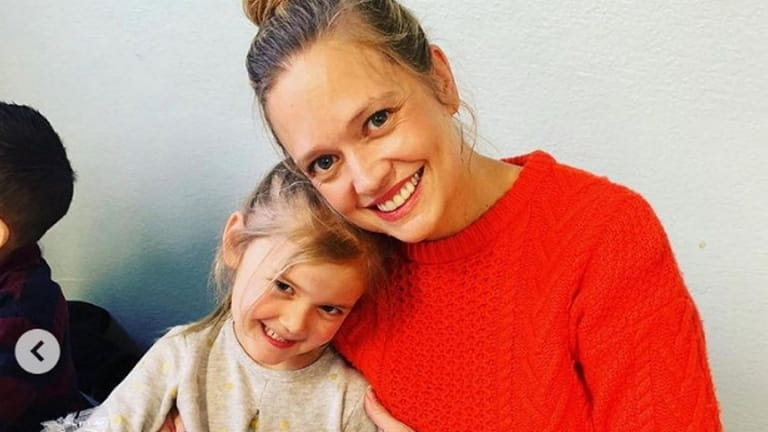Cancer survivor Brienne Heinlein, of Brightwaters, urges screenings while mourning loss of 9-year-old daughter

A Brightwaters cancer survivor who was diagnosed with colon cancer at the age of 39 is urging younger people to pay attention to their bodies — and get screened for a cancer that doesn't always cause symptoms.
Brienne Heinlein, 43, is one of the many younger adults in the United States who are increasingly diagnosed with colon cancer under the age of 50.
Four months after she gave birth to her third daughter, Heinlein, then 39, was on an overnight girls trip when she experienced the worst stomach pain of her life.
“I wasn't sure if I ate something, but I was up all night just uncomfortable,” she said.
After experiencing sharp pain the next night, Heinlein visited urgent care, then the ER, where doctors discovered a blockage, or a tumor, around her bowels and bladder. She underwent a colonoscopy, and she was diagnosed with colon cancer.
Dr. John Procaccino, chief of colon and rectal surgery at North Shore University Hospital, who performed surgery on Heinlein to remove the tumor, said colorectal cancer is the second most common cause of cancer death in the United States behind lung cancer.
Within the next year, approximately 100,000 people will be diagnosed with colon cancer and an additional 50,000 would be diagnosed with rectal cancer, he said.
While he has seen a decrease in incidents of colorectal cancer in older patients, he has noticed a “troublesome” trend of a 10% to 12% increase of colorectal cancer in those under the age of 50.
There are multiple factors linked to a colorectal diagnosis, Procaccino said. A person who has cancer in their family is between three and 10 times more likely to develop it in their lifetime.
Other factors could be pollutants that are either ingested or inhaled, as well as living an unhealthy lifestyle, having obesity or excessive alcohol intake.
The reason for the decrease in older patients, Procaccino said, could be linked to the increased awareness of the importance of getting screened regularly. “And we've gotten the word out about that and a lot of people are in fact, having their colonoscopy,” he said.
About 95% of colorectal cancers are preceded by a benign precursor stage called a polyp, which can occur often between the ages of 45 and 50. If left unchecked, those polyps can become malignant. It can take between two to six years for this process to occur, he said.
“The only way to know that you have one is to be screened,” said Procaccino.
Oftentimes, polyps are without symptoms — one reason why the minimum age recommended for a colonoscopy was changed from 50 to 45. “We’re fortunate if we develop symptoms,” said Procaccino.
Tumors that develop on the right side of one's colon can grow large before they present symptoms, since the waste matter on that part of the colon is liquid, so “things can get by more easily.”
On the left side, waste is already solid. So if there's an obstructing mass, a person will experience symptoms such as cramping, a change in bowel habits or rectal bleeding, Procaccino said.
Before her diagnosis, Heinlein lived an active lifestyle and if it were not for experiencing pain on her left side, she may not have caught her cancer early, she said.
After her tumor was removed, Heinlein received oral chemotherapy for six months.
Feeling empowered, she opened an interior design company. But unfortunately, life threw another wrench at her.
In 2022, Heinlein's second-youngest daughter, Pearl, was diagnosed with leukemia at the age of 9. After an eight-month fight, Pearl lost her battle and died on June 29 from a complication from a treatment.
“It was devastating,” said Heinlein, whose two other daughters are 11 and 5. “I was not expecting it at all, obviously.”
However, Heinlein said losing her daughter and surviving cancer taught her empathy, the importance of connecting with others and a deep gratitude for life.
“There is magic in her death. And blessing and gratitude, accompanied with pain,” she said. “My existence is really simultaneous grief and simultaneous gratitude.”
The cancer survivor urged: “Don't ignore signs in your own body and advocate, advocate, advocate … If you feel something and something feels off, don't ignore it.”
A Brightwaters cancer survivor who was diagnosed with colon cancer at the age of 39 is urging younger people to pay attention to their bodies — and get screened for a cancer that doesn't always cause symptoms.
Brienne Heinlein, 43, is one of the many younger adults in the United States who are increasingly diagnosed with colon cancer under the age of 50.
Four months after she gave birth to her third daughter, Heinlein, then 39, was on an overnight girls trip when she experienced the worst stomach pain of her life.
“I wasn't sure if I ate something, but I was up all night just uncomfortable,” she said.
After experiencing sharp pain the next night, Heinlein visited urgent care, then the ER, where doctors discovered a blockage, or a tumor, around her bowels and bladder. She underwent a colonoscopy, and she was diagnosed with colon cancer.
Dr. John Procaccino, chief of colon and rectal surgery at North Shore University Hospital, who performed surgery on Heinlein to remove the tumor, said colorectal cancer is the second most common cause of cancer death in the United States behind lung cancer.

Colon cancer survivor Brienne Heinlein, 43, with Dr. John Procaccino as she celebrates five years of being cancer free on Wednesday. Credit: Newsday/Alejandra Villa Loarca
Within the next year, approximately 100,000 people will be diagnosed with colon cancer and an additional 50,000 would be diagnosed with rectal cancer, he said.
While he has seen a decrease in incidents of colorectal cancer in older patients, he has noticed a “troublesome” trend of a 10% to 12% increase of colorectal cancer in those under the age of 50.
There are multiple factors linked to a colorectal diagnosis, Procaccino said. A person who has cancer in their family is between three and 10 times more likely to develop it in their lifetime.
Other factors could be pollutants that are either ingested or inhaled, as well as living an unhealthy lifestyle, having obesity or excessive alcohol intake.
The reason for the decrease in older patients, Procaccino said, could be linked to the increased awareness of the importance of getting screened regularly. “And we've gotten the word out about that and a lot of people are in fact, having their colonoscopy,” he said.
About 95% of colorectal cancers are preceded by a benign precursor stage called a polyp, which can occur often between the ages of 45 and 50. If left unchecked, those polyps can become malignant. It can take between two to six years for this process to occur, he said.
“The only way to know that you have one is to be screened,” said Procaccino.
Oftentimes, polyps are without symptoms — one reason why the minimum age recommended for a colonoscopy was changed from 50 to 45. “We’re fortunate if we develop symptoms,” said Procaccino.
Tumors that develop on the right side of one's colon can grow large before they present symptoms, since the waste matter on that part of the colon is liquid, so “things can get by more easily.”
On the left side, waste is already solid. So if there's an obstructing mass, a person will experience symptoms such as cramping, a change in bowel habits or rectal bleeding, Procaccino said.
Before her diagnosis, Heinlein lived an active lifestyle and if it were not for experiencing pain on her left side, she may not have caught her cancer early, she said.
After her tumor was removed, Heinlein received oral chemotherapy for six months.
Feeling empowered, she opened an interior design company. But unfortunately, life threw another wrench at her.
In 2022, Heinlein's second-youngest daughter, Pearl, was diagnosed with leukemia at the age of 9. After an eight-month fight, Pearl lost her battle and died on June 29 from a complication from a treatment.

Brienne Heinlein is shown with her daughter Pearl, who died from leukemia at the age of 9. Credit: Heinlein family
“It was devastating,” said Heinlein, whose two other daughters are 11 and 5. “I was not expecting it at all, obviously.”
However, Heinlein said losing her daughter and surviving cancer taught her empathy, the importance of connecting with others and a deep gratitude for life.
“There is magic in her death. And blessing and gratitude, accompanied with pain,” she said. “My existence is really simultaneous grief and simultaneous gratitude.”
The cancer survivor urged: “Don't ignore signs in your own body and advocate, advocate, advocate … If you feel something and something feels off, don't ignore it.”
